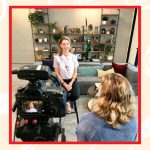Sustainability is currently one of the biggest issues facing agribusiness and startup investing. Around 75% of startups fail after the first 10 years, with lack of motivation, commitment, and passion cited as one of the leading causes of those failures. Similarly, questions around sustainable farming practices are a hot topic of discussion around the world and stand to impact the lives of everyone on the planet. Today, more and more entrepreneurs are looking for sustainable growth for their investments and for the environment.
Luckily, Daphne Mazarakis has plenty of experience in both, first as Brand Director for Kraft Foods and now as a consultant for, and investor in, sustainability-focused food startups. We sat down to discuss mindfulness, sustainability issues, and the different challenges facing women in the world of entrepreneurship.
Mazarakis, a graduate of Northwestern’s School of Engineering, didn’t set out to join the corporate world, but found herself the Brand Manager for Kraft Foods after returning to grad school to receive a degree in business. She explained that while her first passion was entrepreneurship, she initially joined corporate America in order to build strong foundational skills and develop her professional network. Using her eight years of experience with Kraft, Mazarakis ventured out on her own to marry her two passions, entrepreneurship and food, with her first startup, Whey of Life, in 2008.
Mindfulness for Holistic Solutions
Like those 75% of startups, Whey of Life did not make it to its 10 year anniversary, but Mazarakis gained valuable experience and started a practice that has served her well to this day: mindfulness. While it may be a trendy buzzword today, mindfulness was barely on anyone’s radar in 2011 when Mazarakis first took an interest. What’s more impressing, though is to hear her talk about how she developed a mindfulness curriculum for Northwestern’s School of Engineering.
Daphne’s mindfulness practices gave her the “equanimity that [she] needed to engage in very challenging conversations,” and the curriculum grew from those experiences. A curriculum that teaches mindfulness and emotional intelligence fit perfectly with Northwestern’s Whole-Brain Engineering program, which was originally developed to train holistic thinkers, not just engineers. Similarly, sustainable agriculture can be thought of as a holistic approach to feeding the world’s population. Through a combination of innovative technology and business practices, Daphne’s newest investment, Finger Lakes Fish (now LocalCoho), is looking to create a sustainable model for the seafood industry.
Seafood, the Last Frontier of the Grocery Store
Although most food sectors have experienced some amount of upheaval and adjustment with the advent of the organic and sustainability movements, a lot of misinformation and confusion remains among consumers in the seafood isle. Even the “gold standard of wild-caught” can mean different things depending on where it was caught, and over-fishing remains a problem worldwide despite some recent efforts to set limits. In the clip below, Mazarakis outlines some of the issues facing the seafood category.
LocalCoho has set out to solve some of the biggest issues facing the seafood industry by applying “big ag thinking” to a sustainable way of growing fish. Those solutions start with a recirculating aquaculture system, which is a land-based fully-controlled environment that eliminates the need for chemicals in the farming process. LocalCoho, working closely with Cornell University, is building America’s first recirculating aquaculture facility, and is looking to eventually expand to the whole country with the first branded Coho salmon in the seafood case. Unlike traditional “big ag,” LocalCoho is looking to build facilities near urban centers throughout the country to reduce the time from farm to market.
Having a great product is one thing, but consumer awareness is key to generating a sustainable business. Most consumers still do not usually know where their food comes from, but Daphne is optimistic that consumer awareness is on the rise. “Increasingly, consumers are asking the question of where their food comes from, and the same is with fish,” she notes while discussing the difficulties of making her new venture stand out.
In the end, it all comes down to the product. “In the fresh-seafood case, you can’t hide behind […] your traditional consumer-packaged goods like you can do with a case of Velveeta. You are out there exposed, you are naked, and you need to be beautiful. And when you have a controlled environment […] you are able to deliver that beautiful product.”
Confidence
Taking a new product to market is no easy task, but luckily Daphne is not unfamiliar with the challenges many entrepreneurs, especially female entrepreneurs, face.
When Daphne was at Northwestern in the 1990s, her college classes had “between 20 and 30 percent women,” numbers that have only increased slightly in the past 20 years. Even in 2008, Mazarakis “felt like one of the first women entrepreneurs” even though that’s hardly the case. That feeling was largely down to the lack of a connected entrepreneurial ecosystem, an ecosystem that “is so vibrant now,” thanks in part to the efforts of women like Daphne and her associates in the Northwestern Alumni Association Council of One Hundred.
The Council brings female students and alumni together for mentorship and to provide support throughout their careers. Despite advancements made by the Council and similar groups around the country, it can still be difficult for women in startups. “Based off of everything we hear out of Silicon Valley, it certainly seems that women face an uphill battle in terms of raising money.”
Given her background and history of success, I asked Daphne to share her advice for women with the entrepreneurial spirit.
What’s great about Daphne’s advice is that it holds true no matter who you are: confidence breeds success. Earlier in our conversation, Daphne discussed the ideas presented by the Whole-Brain Engineering program, that integrating analytical and creative thinking leads to a holistic approach to problem solving.
That is the approach that businesses will have to take in the future.
Combining passion, confidence, and a holistic business model is the only way that entrepreneurs will be able to find the sustainable growth that their industries, and the planet, require for success.
Daphne and I go into a lot more detail about corporate jobs versus taking an entrepreneurial path, the issues facing sustainable fishing, and her own businesses in the full interview. Check it out to gain insight on some of the issues surrounding sustainability and investment. A better understanding of these issues is key to making your own investment decisions for your future, and the future of the planet.




